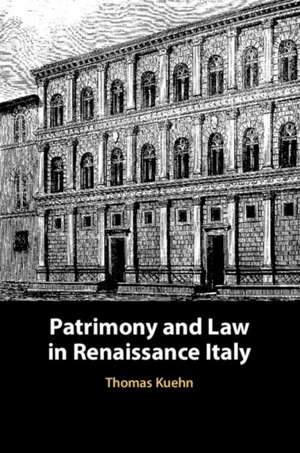Patrimony and Law in Renaissance Italy
Autor Thomas Kuehnen Limba Engleză Paperback – 22 mai 2024
| Toate formatele și edițiile | Preț | Express |
|---|---|---|
| Paperback (1) | 199.71 lei 3-5 săpt. | +13.95 lei 7-13 zile |
| Cambridge University Press – 22 mai 2024 | 199.71 lei 3-5 săpt. | +13.95 lei 7-13 zile |
| Hardback (1) | 582.68 lei 6-8 săpt. | |
| Cambridge University Press – 2 mar 2022 | 582.68 lei 6-8 săpt. |
Preț: 199.71 lei
Nou
Puncte Express: 300
Preț estimativ în valută:
38.21€ • 39.82$ • 31.64£
38.21€ • 39.82$ • 31.64£
Carte disponibilă
Livrare economică 13-27 martie
Livrare express 27 februarie-05 martie pentru 23.94 lei
Preluare comenzi: 021 569.72.76
Specificații
ISBN-13: 9781009073967
ISBN-10: 1009073966
Pagini: 266
Dimensiuni: 229 x 150 x 16 mm
Greutate: 0.36 kg
Editura: Cambridge University Press
ISBN-10: 1009073966
Pagini: 266
Dimensiuni: 229 x 150 x 16 mm
Greutate: 0.36 kg
Editura: Cambridge University Press
Cuprins
1. Introduction; 2. Bartolus and Family in Law; 3. The Divisible Patrimony: Legal Property Relations; of Fathers and Sons in Renaissance Florence; 4. Property of Spouses in Law in Renaissance Florence; 5. Societas and Fraterna of Brothers; 6. Fideicommissum and Law: Consilia of Bartolomeo Sozzini and Filippo Decio; 7. Estate Inventories as Legal Instruments in Renaissance Italy; 8. Prudence, Personhood, and Law in Renaissance Italy; 9. Addendum: A Final Case; 10. Conclusion.
Recenzii
'Patrimony and Law in Renaissance Italy analyzes the family as part of the sharing economy at the intersection of law, property, and households in Renaissance Italy. It is an essential work for scholars seeking to understand the entangled development of individual legal rights amidst the increasing codification of family law and the evolving familial economy of medieval and Renaissance Italy.' Caroline Castiglione, Brown University
'This important study features the creative tension between a legal environment oriented toward individuals and a social world that prized families and patrimonies. The writings of jurists who wrestled with this tension reveal a 'sharing economy,' a form of economic behavior whose existence upends our simple teleologies of gift and market.' Daniel Lord Smail, Harvard University
'Was familia the fixed point of reference for Renaissance Italy's patriarchal social order? Kuehn complicates and illuminates our understanding of it. The obsession with assembling and transferring property over generations came relatively late, with legal forms evolving to make patrimony, memory, and dignitas the very substance of family identity over time. Complex, fascinating, and necessary reading.' Nicholas Terpstra, University of Toronto
'This important study features the creative tension between a legal environment oriented toward individuals and a social world that prized families and patrimonies. The writings of jurists who wrestled with this tension reveal a 'sharing economy,' a form of economic behavior whose existence upends our simple teleologies of gift and market.' Daniel Lord Smail, Harvard University
'Was familia the fixed point of reference for Renaissance Italy's patriarchal social order? Kuehn complicates and illuminates our understanding of it. The obsession with assembling and transferring property over generations came relatively late, with legal forms evolving to make patrimony, memory, and dignitas the very substance of family identity over time. Complex, fascinating, and necessary reading.' Nicholas Terpstra, University of Toronto
